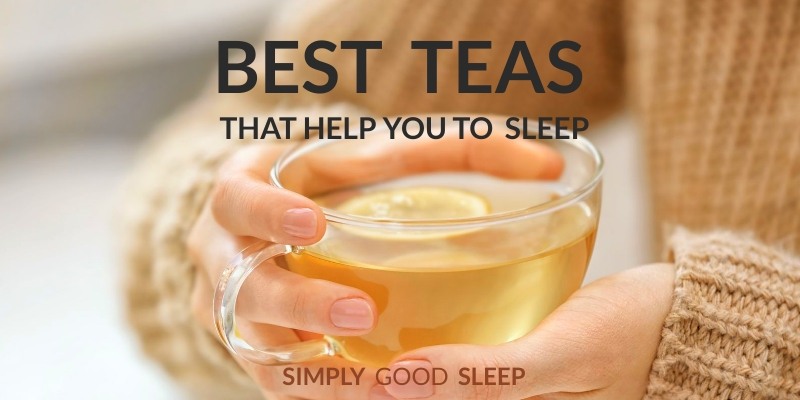
Tea is considered to be the most popular beverage in the world (after water of course). In just the United States, 80% of American households are tea drinkers with 50% of people drinking tea on a daily basis. Sipping herbal teas can help you to relax and sleep at night. We have picked out the best teas to help you to settle down and safely off to dreamland. Here are six of the best teas that help you to sleep at night.
If you make a purchase through our referral links, we may earn a small commission at no cost to you. Details here
Chamomile Tea
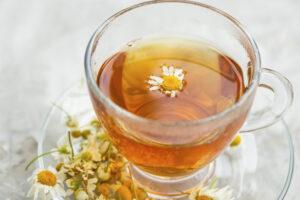 Chamomile tea is usually the go-to tea for those wanting to grab some shut-eye! Chamomile comes from the chamomile flower and has been used as a remedy for centuries. This herbal tea is free from caffeine, which isn’t the only reason it has maintained its reputation as the king of sleep-promoting teas.
Chamomile tea is usually the go-to tea for those wanting to grab some shut-eye! Chamomile comes from the chamomile flower and has been used as a remedy for centuries. This herbal tea is free from caffeine, which isn’t the only reason it has maintained its reputation as the king of sleep-promoting teas.
Chamomile has also been found to do a few other cool and handy things to our body and brain. Chamomile tea contains an antioxidant called apigenin which can also ease anxiety, putting us into a more tranquil state of mind and making it easier for us to fall asleep.
Chamomile helps soothe stress and can additionally help to ease an upset stomach. All of these benefits play a role in our body’s ability to calm down and to fall asleep.
Valerian Tea
Valerian root is a potent natural sedative. It has been used for improving sleep and reducing anxiety and insomnia since the second 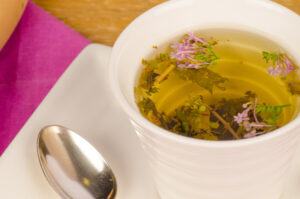 century.
century.
Made from the root of the valerian plant, valerian tea is another good option for those seeking better rest. Valerian tea has powerful sedative affects. Valerian can also soothe insomnia and quell anxiety. But this tea has one more caveat; it takes a few days to almost nearly a week for its sleep-promoting powers to really show their stuff. So don’t expect a quick sleep right away!
Valerian tea is considered a stronger alternative to standard chamomile tea. Studies into valerian proved more conclusive than those on chamomile. The studies here showed that insomnia sufferers were able to see a noticeable improvement in their symptoms when drinking valerian tea regularly.
Decaf Green Tea
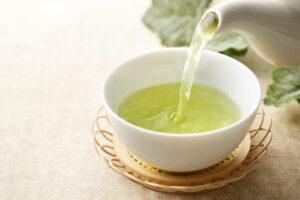 You can not go wrong with green tea. That includes using decaffeinated green tea as a sleep aid. Green tea contains a compound called theanine. Theanine can help reduce stress and improve the overall quality of sleep.
You can not go wrong with green tea. That includes using decaffeinated green tea as a sleep aid. Green tea contains a compound called theanine. Theanine can help reduce stress and improve the overall quality of sleep.
A study of young men in their twenties showed those who used an L-theanine supplement before going to bed saw improved sleep efficiency and quality, and woke up feeling more energized and refreshed.
Green tea is also rich in polyphenol antioxidants, beneficial to health. Benefits of green tea may include weight loss, boost in cognitive performance, better digestion, and a reduced risk of diabetes, heart disease, and cancer.
Lavender Tea
More than just a pretty flower, lavender has also been an ancient herbal remedy. In the Greco-Roman world lavender was thought to relax, soothe and settle people down. And its lavender’s aroma certainly plays a role in its calming properties as a sleep-positive tea! Some studies have shown inhaling lavender aroma can ameliorate insomnia, improve sleep, decrease anxiety and can even help you feel less fatigued!
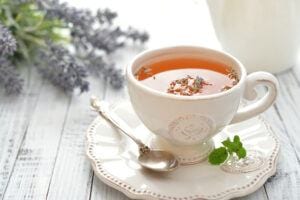
Lavender has a host of benefits including reducing stress and anxiety – the two main factors that keep people up at night. Perhaps just the smell of lavender is enough to put people to sleep; a study from 2005 showed that just smelling lavender oil before bed increased how long a person spent in deep sleep to allow them to wake up feeling more refreshed the next day.
As another caffeine-free tea, lavender tea has been shown to be beneficial for women. One study of postnatal mothers showed that the participants drinking lavender tea were less likely to have depression and fatigue symptoms. On top of that, the benefits disappeared when they stopped drinking lavender tea.
Lemon Balm Tea
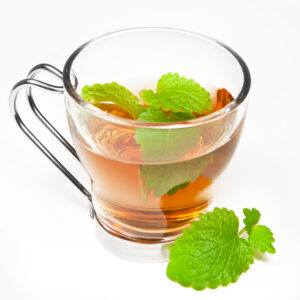
Lemon balm is a perennial herb from the mint family. With its mild, pleasant, lemony-scented leaves, lemon balm has been used in teas by insomniacs since the Middle Ages. It reduces stress and anxiety and improves digestion. There are plenty of pre-made teas available or you can brew your own by steeping lemon balm leaves in hot water.
Lemon balm is best when combined with other herbs. A 2006 study showed that valerian and lemon balm was a particularly beneficial combination in improving sleep disorders and restlessness.
Other benefits of lemon balm tea? Initial studies have found that lemon balm tea may improve heart and skin health, and antioxidant levels.
Passionflower Tea
Experience a restful sleeping experience with passionflower tea! Passionflower tea is made from the stems, flowers, and dried leaves 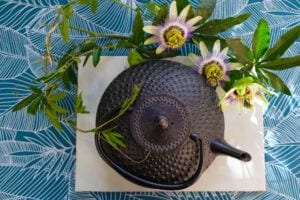 of the Passiflora plant. Some studies have corroborated passionflower’s amazing sleep-promoting qualities.
of the Passiflora plant. Some studies have corroborated passionflower’s amazing sleep-promoting qualities.
One such study found that those who consumed passionflower tea daily for seven days reported better sleep quality, compared to participants who did not drink the tea. Passionflower tea is also certain to get your mind and body ready to hit the hay by helping you to de-stress! Brew up this tea if you’d like to get some rest tonight.
Make a Perfect Cup of Herbal Tea in Six Simple Steps
Step 1: Boil some water.
Step 2: Place loose leaf tea herbs in the tea strainer.
Step 3: Pour your boiled water into your cup and submerge the herbs in the hot water.
Step 4: Cover your tea and allow it to steep for 5 to 15 minutes.
Step 5: Strain your tea.
Step 6: Sweeten your tea with a little bit of honey or with any other sweetener that you prefer
Make Tea Part of Your Bedtime Sleep Routine
Combine the nightly ritual of tea drinking with good sleep hygiene and other sleep-positive activities, like reading a book, and listening to relaxing music.
To also get some of the best rest, you can try to limit your alcohol and caffeine consumption, especially close to bedtime. Try not to eat too late at night or exercise too close to bed time. Exercising is great of course, but it can get your heart rate up which may make it more of a challenge to fall asleep.
While sipping herbal teas at bedtime probably may not solve your sleep issues, it can be part of the complete solution.
Word of Caution
We are happy that you are exploring herbal teas, and you are wise to be cautious. Some herbs are known to interact with over-the-counter and prescription medications . If you are taking medications, have a medical condition, or have a medical procedure booked, it is always a good idea to consult your doctor or pharmacist before using a herbal tea.
Additionally, if you are pregnant or nursing, please check in with your doctor before using herbal teas.
Final Words
Early to bed, and early to rise won’t be an impossible feat anymore with these great teas for sleep. Definitely give one or all of these superb brews a try to see which one is right for you! Brew up a pot or two of one of these amazing teas, put your phone and alarm far out of reach and settle in for some quality sleep!

4 Responses
Does decaffeinated green tea mean it has no caffeine?
Decaf green tea has small amount of caffeine – about 1 to 2 milligrams – not nearly enough to affect your sleep. Decaf green tea is good for sleep. Decaf green tea, with its theanine content, can help you feel relaxed and calm at bedtime for better sleep at night.
Chamomile tea is perfect for me. I always drink one whenever I know I will have a hard time falling asleep. I don’t drink it daily because I like to switch things around. I also like drinking Green Tea for energy and didn’t know you could drink decaf green tea for a better sleep.
Decaffeinated green tea may not be entirely caffeine-free. It has 2 milligrams of caffeine in it, not nearly enough to affect your sleep. If you are sensitive to caffeine, it can affect you and you’d be better off staying with chamomile and/or trying out some of the other herbal teas for sleep.